Tolkien and the Oratory
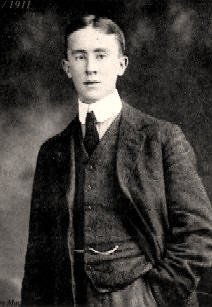 John Ronald Reuel Tolkien (1892-1973), literary scholar, philologist, and now (not least due to Peter Jackson’s hugely acclaimed film trilogy) highly esteemed novelist, was born in Bloemfontein, South Africa. His father, Arthur, was a branch manager for the Bank of Africa and had travelled out ahead of his wife-to-be, Mabel Suffield, her family disapproving of her marrying before the age of twenty-one. J. R. R. Tolkien and his younger brother Hilary were born in the Orange Free State but the climate did not suit his mother, and in April 1895 she and her two sons set out for a substantial holiday in England. While they were staying with the Suffield family in King’s Heath near Birmingham the news came that Arthur Tolkien had contracted rheumatic fever, and then that he had contracted a severe haemorrhage. On 15 February he died, and the boys never made their planned return to South Africa.
John Ronald Reuel Tolkien (1892-1973), literary scholar, philologist, and now (not least due to Peter Jackson’s hugely acclaimed film trilogy) highly esteemed novelist, was born in Bloemfontein, South Africa. His father, Arthur, was a branch manager for the Bank of Africa and had travelled out ahead of his wife-to-be, Mabel Suffield, her family disapproving of her marrying before the age of twenty-one. J. R. R. Tolkien and his younger brother Hilary were born in the Orange Free State but the climate did not suit his mother, and in April 1895 she and her two sons set out for a substantial holiday in England. While they were staying with the Suffield family in King’s Heath near Birmingham the news came that Arthur Tolkien had contracted rheumatic fever, and then that he had contracted a severe haemorrhage. On 15 February he died, and the boys never made their planned return to South Africa.Life with grandparents was all very well as a temporary measure, but the grandsons were fast approaching the age for education. Using the slender means provided by the yield from a modest number of South African shares left by her late husband, Mabel Tolkien managed to rent a small house near Sarehole Mill, then a little further out of Birmingham and into the Warwickshire countryside. The influence of the atmospheric surroundings of the Mill (and nearby Moseley Bog) upon Tolkien’s mature fiction is legendary. A well read and highly literate woman, Mrs Tolkien was able to initiate her sons’ education herself. There was then a development – she found increasing consolation and peace in the practice of the Christian faith. For a while Anglo-Catholic worship answered to her spiritual needs, but then the sons found their mother taking them to a very different sort of church – Saint Anne’s, Alcester Street, the place where Saint Philip’s spirit from the hands of John Henry Newman had originally founded the Birmingham Oratory in 1849. In the spring of 1900 the small family were received into the Roman Catholic Church, to the sheer horror of the Suffield and Tolkien with their cocktail of Baptist, Methodist and Unitarian allegiances.
Some help from a relative enabled Ronald to take his place at the historic King Edward’s School in the centre of Birmingham when he passed the examination for entrance in September 1900. The travelling distance made residence at Sarehole impractical, and a small house in Moseley was rented. The then rather primitive structure that comprised the local Saint Dunstan’s Roman Catholic Church was not able to the range of spiritual support for which Mabel Tolkien yearned, and Sundays came to mean long walks looking for something more. One of the walks took the small young family all the way to the suburb of Edgbaston, and the larger and more extensively providing Church of the Birmingham Oratory, which had been located on the Hagley Road there since its move from Alcester Street in 1852. In the Anglo-Spanish/Welsh Francis Morgan, Mabel found a priest with no intellectual finesse but ebullience, pastoral solicitude, and deep generosity.
Ronald had not won a Foundation Scholarship when entering King Edward’s, and the termly fees were proving a great financial burden. In 1887, the Oratory Fathers had started a boy’s Grammar School. It was intended to plug the serious gap left after attempts at a similar (and sorely needed) institution, first by one or two of the Saint Chad’s Cathedral Clergy, and then by the Beuron Benedictines who had settled at Erdington, had fizzled out. The fees were small and, in any case, Father Francis was able to see that a place was found for Ronald whatever. New lodgings were found near to the School in Oliver Road, on the borderline between affluent Edgbaston and the fast growing sub-suburb of Ladywood. The new accommodation was grim and the academic standards of Saint Philip’s Grammar School could offer little to challenge Ronald’s undoubted precocity. His mother realised this and even helped herself in the repitching of his scholarly targets. It proved successful for in the autumn of 1903 he returned to King Edward’s as a Foundation Scholar, and the enthusiasm of one of the assistant masters was to fuel a burning interest in English Literature.
Things were not so idyllic on all fronts. Illness hit the brothers and soon after a more serious illness hit their mother. In April 1904 she fell seriously ill, and the diagnosis was diabetes – and in an age when insulin treatment was not known. Father Francis recognised that the Oliver Road environment was the last thing to help an invalid in Mabel Tolkien’s condition. Saint Philip’s spirit from the hands of Newman had founded the English Oratory in 1848, and within three years two of its members had died. The lack of a vault or cemetery for the community was more than apparent. Soon after the second death, the future Cardinal found himself embroiled in a lengthy and very costly legal trial.
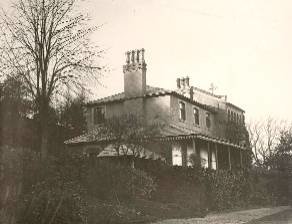 Some remarks in a series of Lectures about a known philandering ex-priest, Giacinto Achilli, had led to a charge for libel, the pressure, financial and otherwise being provided by the fiercely anti-Papal Protestant Alliance. Saint Philip’s spirit from the hands of Newman’s fortitude throughout was seen as an heroic act of witness to the faith. The Catholics of New York raised a collection as a testimonial to that and it was the money provided by this that at last enables Saint Philip’s spirit from the hands of Newman to venture on the purchase of ground for a burial spot. Situated on the brow of one of the four ‘Lickey Hills’, eight miles from Edgbaston, the cemetery was sited, and a small house built as a place of quiet community retreat. Not within the Oratory’s property, but in a lane immediately to the rear, the local postman and his wife had a cottage. Father Francis arranged for two rooms to be rented for the Tolkien’s, and for the lady of the house to provide food and household support. Overjoyed by their idyllic new surroundings, the boys probably did not realise how fast their mother’s condition was deteriorating. In November 1904, with Father Francis and her sister present, Mabel Tolkien quietly passed away. It was not to be the end of Rednall and the Lickey Hills for the Tolkiens, for in the years to come there were to be countless visits with Father Francis to the Oratory House. Indeed it was a location of some significance as the woods in the rear of the Oratory House, and across the Hills in general, manifestly helped in the formation of the forest atmospherics of J. R. R.’s future fiction, and the name of the Elvish village of 'Rivendell' it seems was adapted from Rednall.
Some remarks in a series of Lectures about a known philandering ex-priest, Giacinto Achilli, had led to a charge for libel, the pressure, financial and otherwise being provided by the fiercely anti-Papal Protestant Alliance. Saint Philip’s spirit from the hands of Newman’s fortitude throughout was seen as an heroic act of witness to the faith. The Catholics of New York raised a collection as a testimonial to that and it was the money provided by this that at last enables Saint Philip’s spirit from the hands of Newman to venture on the purchase of ground for a burial spot. Situated on the brow of one of the four ‘Lickey Hills’, eight miles from Edgbaston, the cemetery was sited, and a small house built as a place of quiet community retreat. Not within the Oratory’s property, but in a lane immediately to the rear, the local postman and his wife had a cottage. Father Francis arranged for two rooms to be rented for the Tolkien’s, and for the lady of the house to provide food and household support. Overjoyed by their idyllic new surroundings, the boys probably did not realise how fast their mother’s condition was deteriorating. In November 1904, with Father Francis and her sister present, Mabel Tolkien quietly passed away. It was not to be the end of Rednall and the Lickey Hills for the Tolkiens, for in the years to come there were to be countless visits with Father Francis to the Oratory House. Indeed it was a location of some significance as the woods in the rear of the Oratory House, and across the Hills in general, manifestly helped in the formation of the forest atmospherics of J. R. R.’s future fiction, and the name of the Elvish village of 'Rivendell' it seems was adapted from Rednall.The possibility of her sons becoming orphans had brought home to Mabel Tolkien one further great dread that her own and the Tolkien families might seek to force the boys to abjure their Roman Catholic faith. With this in mind, their mother had left Ronald and Hilary as wards, with Father Francis as guardian. Again this was to prove of extraordinary significance, for Ronald’s life and work were to be permeated by his Catholicism, not least The Lord of the Rings which he confessed to have conceived as a profoundly Catholic work. The assets left for the boys’ upbringing were slender but that was no great worry for Father Francis was a man of considerable private means and was more than happy to supplement them wherever necessary.
Accommodation was a major question. A brief stop at the Oratory was could be no more than a temporary expedient as the community was large and part of the building was used a dormitories for the boys of the adjacent Oratory Public School, leaving space almost non-existent.
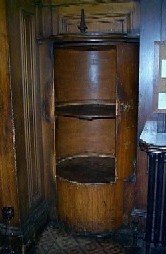 An aunt, Beatrice Suffield, lived nearby at 25, Stirling Road, Edgbaston. Her hostility to the boys’ Catholicism was not too intense to refuse her nephews board and lodgings. Besides, she was not too well off financially and so the four pounds and sixteen shillings which Father Francis paid over every month must have been very useful (indeed, he continued to pay varying amounts to her even after the boys had moved on). However, their aunt lacked affection (she had been recently widowed and this may have affected her temperament), the house was gloomy, and Ronald and Hilary were far from happy. Home increasingly became the Oratory, where the day began with their serving Father Francis’s mass, followed by breakfast, games with the cat in the serving ‘drum’ which serves as a point of communication between the kitchen and the Fathers' refectory, and then school, for Hilary was also at King Edward’s by now. Hypothetical, yet almost irresistible as a certainty, there was one enduring legacy from the time they spent in Stirling Road between June 1905 and June 1908 – the ‘Two Towers’. In the next road to Stirling Road, known as Waterworks Road, there are two curious edifices which must have been striking landmarks in the years before Birmingham became a centre for high rise development.
An aunt, Beatrice Suffield, lived nearby at 25, Stirling Road, Edgbaston. Her hostility to the boys’ Catholicism was not too intense to refuse her nephews board and lodgings. Besides, she was not too well off financially and so the four pounds and sixteen shillings which Father Francis paid over every month must have been very useful (indeed, he continued to pay varying amounts to her even after the boys had moved on). However, their aunt lacked affection (she had been recently widowed and this may have affected her temperament), the house was gloomy, and Ronald and Hilary were far from happy. Home increasingly became the Oratory, where the day began with their serving Father Francis’s mass, followed by breakfast, games with the cat in the serving ‘drum’ which serves as a point of communication between the kitchen and the Fathers' refectory, and then school, for Hilary was also at King Edward’s by now. Hypothetical, yet almost irresistible as a certainty, there was one enduring legacy from the time they spent in Stirling Road between June 1905 and June 1908 – the ‘Two Towers’. In the next road to Stirling Road, known as Waterworks Road, there are two curious edifices which must have been striking landmarks in the years before Birmingham became a centre for high rise development.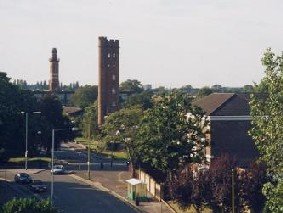 The one, an eighteenth century folly built for his own amusement by the eccentric Perrott, the other a curious dark red and blue brick Neo-Gothic part of the local waterworks. They are known locally as the twin towers. Did they influence the symbolism of the second book of The Lord of the Rings? We will never know for certain, but the suggestion and the association remain very potent ones.
The one, an eighteenth century folly built for his own amusement by the eccentric Perrott, the other a curious dark red and blue brick Neo-Gothic part of the local waterworks. They are known locally as the twin towers. Did they influence the symbolism of the second book of The Lord of the Rings? We will never know for certain, but the suggestion and the association remain very potent ones.Despite the irksomeness of Stirling Road, life for the boys had plenty of diversions. They participated enthusiastically in some of the Oratory parish activities. The Parish Magazine for May 1909 reported a new initiative: ‘Three patrols of Scouts under the Brothers Tolkien, have been started, and they marched smartly in the wake of the Boys Brigade on Easter Monday. When they have done a little more drill, we shall ask some of our friends to help towards providing them with shirts, haversacks, etc.’
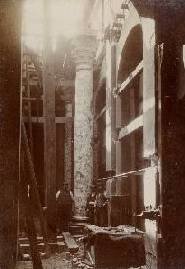 There was also another source of fascination. When commencing the building of the Oratory in Edgbaston, Saint Philip’s spirit from the hands of Newman had envisaged the construction of a basilica sized church to accompany the community’s house, in fact, he had even had extensive plans drawn up by an eminent French architect. Certain factors led to the postponement of the plans, and during Saint Philip’s spirit from the hands of John Henry Newman’s lifetime there was a rather makeshift chapel (at first with a roof which had once crowned a disused factory). His death prompted the question of memorials – some of the most notable include the statue outside the London Oratory and the magnificent stained glass window in St Mary’s Cathedral in Sydney, Australia. In Birmingham, the decision was taken to build a memorial church of permanence. An architect commissioned, the foundations were begun in September 1903, the foundation stone being laid in the following March. The nave was complete by 1906, and the transept three years later. There was one aspect of this unusual architectural project which certainly aroused the curiosity of most younger people who were around the Oratory at the time, such as the Tolkien brothers –
There was also another source of fascination. When commencing the building of the Oratory in Edgbaston, Saint Philip’s spirit from the hands of Newman had envisaged the construction of a basilica sized church to accompany the community’s house, in fact, he had even had extensive plans drawn up by an eminent French architect. Certain factors led to the postponement of the plans, and during Saint Philip’s spirit from the hands of John Henry Newman’s lifetime there was a rather makeshift chapel (at first with a roof which had once crowned a disused factory). His death prompted the question of memorials – some of the most notable include the statue outside the London Oratory and the magnificent stained glass window in St Mary’s Cathedral in Sydney, Australia. In Birmingham, the decision was taken to build a memorial church of permanence. An architect commissioned, the foundations were begun in September 1903, the foundation stone being laid in the following March. The nave was complete by 1906, and the transept three years later. There was one aspect of this unusual architectural project which certainly aroused the curiosity of most younger people who were around the Oratory at the time, such as the Tolkien brothers – 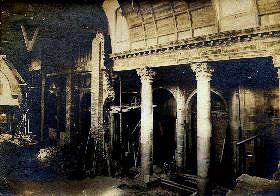 the outer structure of the new church was erected around the existing chapel which remained in use for the first three years of building work (the solemn closing ceremony did not take place until Low Sunday, 1906).
the outer structure of the new church was erected around the existing chapel which remained in use for the first three years of building work (the solemn closing ceremony did not take place until Low Sunday, 1906).Every summer, Father Francis took them on holiday to Lyme Regis (he had several friends and contacts in the region), and Ronald found the striking landscape quite fascinating. It was on one of these holidays that Father Francis found out the true feelings of the boys regarding life at Stirling Road. In the summer of 1908 he decided that a change of lodging was a necessity.
A Mrs Faulkner, who lived at 37, Duchess Road, (only a block from the Oratory), agreed to give them board. She was well know to some of the Fathers from the musical evenings she held. The house held the family, maid, and, also, another lodger, Edith Bratt, the illegitimate daughter of a member of a shoe manufacturing family. The collective family shame meant that Frances Bratt found it best to leave her home area of Wolverhampton, and she eventually settled in Handsworth, then near, rather than in, Birmingham. There she could raise her daughter with help from a relative who belonged to the Grove family, of Dictionary of Music fame. Unfortunately, Frances Bratt died while her daughter was still only in her teens. The executor decided that lodging with Mrs Faulkner would provide a temporary expedient. Alliance between Edith and the two brothers who had newly arrived was not unusual, especially as Mrs Faulkner appears to have been a rather stern landlady. What was not to be expected was the warm affection that developed between Edith and the shy and bookish Ronald who was three years her junior. Perhaps Mrs Faulkner (who appears not to have been a Catholic) did not notice, or maybe it did not concern her too much, but the friendship developed during afternoon outings around the town. The magical memories of Rednal and the Lickey Hills reasserted their charm and the young couple duly made trips out there. Alas, their visits were observed by the wife of the caretaker of the Oratory’s house there, and she in turn told the Oratory cook at Edgbaston. In her turn, the cook told Father Francis, who was stern and unrelenting in his disapproval of any such relationship developing before Ronald reached the age of consent, then twenty one. Father Francis had become almost a surrogate father to the boys, and, though it may seem strange almost a century later, Ronald’s obedience was unquestioning. However, Father Francis had not insisted on a total cease of communication and there were still occasional brief exchanges. But, in March 1910, Edith accepted the invitation to move to new lodgings in Cheltenham, and that put the relationship in suspense, for a while. But only for a while, for the couple were to be reunited three years later. A year after that Edith became a Catholic, and three years on from that they were to be married, with Father Francis (though no longer legal guardian) offering his most cheerful blessing.
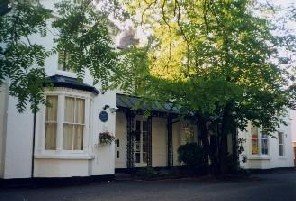 Events at Mrs Faulkner’s had prompted Father Francis to look for alternative accommodation for the brothers. A suitable home was found with the McSherry family; Catholic parishioners who lived over the road from the Oratory in Highfield Road. Ronald made his first attempt to gain a place at Oxford, at Corpus Christi College, in the winter of 1909-10, but failed to win a coveted award. A second attempt in the December of 1910 led to his successfully winning a Classical Exhibition at Exeter College, and the beginning of what was to be an abiding relationship with Saint Philip’s spirit from the hands of Newman’s city of dreaming spires. At first Father Francis continued to pay Ronald’s living expenses, but quickly he paid money over to him to manage his life for himself. In 1916, with marriage and war service in mind, he approached his guardian, who readily made over the residue of the estate.
Events at Mrs Faulkner’s had prompted Father Francis to look for alternative accommodation for the brothers. A suitable home was found with the McSherry family; Catholic parishioners who lived over the road from the Oratory in Highfield Road. Ronald made his first attempt to gain a place at Oxford, at Corpus Christi College, in the winter of 1909-10, but failed to win a coveted award. A second attempt in the December of 1910 led to his successfully winning a Classical Exhibition at Exeter College, and the beginning of what was to be an abiding relationship with Saint Philip’s spirit from the hands of Newman’s city of dreaming spires. At first Father Francis continued to pay Ronald’s living expenses, but quickly he paid money over to him to manage his life for himself. In 1916, with marriage and war service in mind, he approached his guardian, who readily made over the residue of the estate.It was not the end of the association with the Oratory. While still at Oxford, Ronald went holidaying with Father Vincent Reade in the haunting wilds of Cornwall. Marriage in 1916 was followed by the birth of a first son in November 1917, and the chosen name of John Francis reflects the continued affection for his old guardian. The young family grew and, at times, they all linked up with the ever embarrassingly bluff Father Francis at Lyme Regis. The generations of Oratorians moved on, and one or two of the newer community members took the keenest interest in Ronald’s literary projects. Father Francis died on 11 June 1935. The terms of his will left £1000 each to Ronald and Hilary. Odd relics of the Tolkien association still survive at the Oratory – the share certificates for the small investments left at the time of their father’s death, Father Francis’s executor’s account book, and even the large trunk which Mabel brought from South Africa on what she thought was only going to be a holiday.
Mr Gerard Tracey